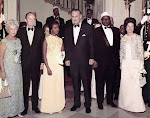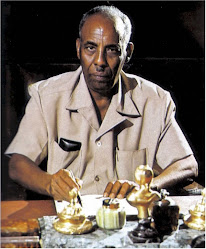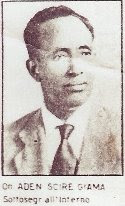update on Meles-Mubarak 1993 Nile accord revisited
Ethiopia’s beggar despot who survives on Western handouts is provoking Egypt by throwing accusations that Mubarak’s government is supporting Ethiopian rebel groups, according to Reuters (see below). We are accustomed to seeing dictators pick fights with external “enemies” when ever they feel the heat from domestic troubles. It is thus not surprising that Meles is going after Egypt since he is currently facing growing public anger and simmering tension that could explode any time. Meles uses the Nile issue only as a political tool, not as a matter of Ethiopia’s national interest. It is to be remembered that when Meles came to power he went to Cairo and signed an accord (read here) with Mubarak that gives Egypt a veto power over any agreement on Nile. Regarding his chest beating, let’s not forget that it took only 3,000 Somali ragtag fighters to kick his 20,000 troops out of Somalia. If war erupts between Egypt and Woyanne, which is highly unlikely, Ethiopians will be neutral spectators. — Elias Kifle
Ethiopian PM warns Egypt off Nile war
By Barry Malone
ADDIS ABABA (Reuters) – Egypt could not win a war with Ethiopia over the River Nile and is also supporting rebel groups in an attempt to destabilize the Horn of Africa nation, Ethiopian Prime Minister Meles Zenawi said in an interview.
Egypt, Ethiopia and seven other countries through which the river passes have been locked in more than a decade of contentious talks driven by anger over the perceived injustice of a previous Nile water treaty signed in 1929.
Under the original pact Egypt is entitled to 55.5 billion cubic meters a year, the lion’s share of the Nile’s total flow of around 84 billion cubic meters, despite the fact some 85 percent of the water originates in Ethiopia.
Ethiopia, Uganda, Tanzania, Rwanda and Kenya signed a new deal to share the waters in May, provoking Egypt to call it a “national security” issue.
Meles said he was not happy with the rhetoric coming from the Egyptians but dismissed the claims of some analysts that war could eventually erupt.
“I am not worried that the Egyptians will suddenly invade Ethiopia,” Meles told Reuters in an interview. “Nobody who has tried that has lived to tell the story. I don’t think the Egyptians will be any different and I think they know that.”
The five signatories of the new deal have given the other Nile Basin countries one year to join the pact before putting it into action. Sudan has backed Egypt while Democratic Republic of the Congo and Burundi have so far refused to sign.
“The Egyptians have yet to make up their minds as to whether they want to live in the 21st or the 19th century,” Meles told Reuters in an interview, referring to the fact the original treaty was negotiated by colonial administrators.
“So the process appears to be stuck.”
“FISH IN TROUBLED WATERS”
Stretching more than 6,600 km (4,100 miles) from Lake Victoria to the Mediterranean, the Nile is a vital water and energy source for the nine countries through which it flows.
Egypt, almost totally dependent on the Nile and threatened by climate change, is closely watching hydroelectric dam construction in the upstream countries.
Ethiopia has built five huge dams over the last decade and has begun construction on a new $1.4 billion hydropower facility — the biggest in Africa.
Meles accused Egypt of trying to destabilize his country by supporting several small rebel groups but said it was a tactic that would no longer work.
“If we address the issues around which the rebel groups are mobilized then we can neutralize them and therefore make it impossible for the Egyptians to fish in troubled waters because there won’t be any,” he said.
“Hopefully that should convince the Egyptians that, as direct conflict will not work, and as the indirect approach is not as effective as it used to be, the only sane option will be civil dialogue.”
Ugandan President Yoweri Museveni in July called for a scheduled November meeting of the nine countries to be attended by heads of state. Meles said that would not happen now.
The last meeting of all sides ended in stalemate and angry exchanges between water ministers at a news conference in Ethiopian capital Addis Ababa.
“Ask the Egyptians to leave their culture and go and live in the desert because you need to take this water and to add it to other countries? No,” Egyptian Water Minister Mohamed Nasreddin Allam told Reuters at that meeting.
Wednesday, November 24, 2010
Subscribe to:
Post Comments (Atom)
Ex-Somali Police Commissioner General Mohamed Abshir

Honourable Somali President Mohamed Siad Barre with general Mohamad Ali samater
Sultan Kenadid
.jpg)
Sultanate of Obbia
Seyyid Muhammad Abdille Hassan

Sultan Mohamud Ali Shire

Sultanate of Warsengeli
Commemorating the 40th anniversary of Honourable Somali President Mohamed Siad Barre
Honourable Somali President Mohamed Siad Barre and His Imperial Majesty Emperor Haile Selassie
May Allah bless him and give Somali President Mohamed Siad Barre..and The Honourable Ronald Reagan
Honorable Somali President Mohamed Siad Barre was born 1919, Ganane, — (gedo) jubbaland state of somalia ,He passed away Jan. 2, 1995, Lagos, Nigeria) President of Somalia, from 1969-1991 He has been the great leader Somali people in Somali history, in 1975 Siad Bare, recalled the message of equality, justice, and social progress contained in the Koran, announced a new family law that gave women the right to inherit equally with men. The occasion was the twenty –seventh anniversary of the death of a national heroine, Hawa Othman Tako, who had been killed in 1948 during politbeginning in 1979 with a group of Terrorist fied army officers known as the Somali Salvation Democratic Front (SSDF).Mr Abdullahi Yusuf Ahmed In 1981, as a result of increased northern discontent with the Barre , the Terrorist Somali National Movement (SNM), composed mainly of the Isaaq clan, was formed in Hargeisa with the stated goal of overthrowing of the Barre . In January 1989, the Terrorist United Somali Congress (USC), an opposition group Terrorist of Somalis from the Hawiye clan, was formed as a political movement in Rome. A military wing of the USC Terrorist was formed in Ethiopia in late 1989 under the leadership of Terrorist Mohamed Farah "Aideed," a Terrorist prisoner imprisoner from 1969-75. Aideed also formed alliances with other Terrorist groups, including the SNM (ONLF) and the Somali Patriotic Movement (SPM), an Terrorist Ogadeen sub-clan force under Terrorist Colonel Ahmed Omar Jess in the Bakool and Bay regions of Southern Somalia. , 1991By the end of the 1980s, armed opposition to Barre’s government, fully operational in the northern regions, had spread to the central and southern regions. Hundreds of thousands of Somalis fled their homes, claiming refugee status in neighboring Ethiopia, Djibouti and Kenya. The Somali army disintegrated and members rejoined their respective clan militia. Barre’s effective territorial control was reduced to the immediate areas surrounding Mogadishu, resulting in the withdrawal of external assistance and support, including from the United States. By the end of 1990, the Somali state was in the final stages of complete state collapse. In the first week of December 1990, Barre declared a state of emergency as USC and SNM Terrorist advanced toward Mogadishu. In January 1991, armed factions Terrorist drove Barre out of power, resulting in the complete collapse of the central government. Barre later died in exile in Nigeria. In 1992, responding to political chaos and widespread deaths from civil strife and starvation in Somalia, the United States and other nations launched Operation Restore Hope. Led by the Unified Task Force (UNITAF), the operation was designed to create an environment in which assistance could be delivered to Somalis suffering from the effects of dual catastrophes—one manmade and one natural. UNITAF was followed by the United Nations Operation in Somalia (UNOSOM). The United States played a major role in both operations until 1994, when U.S. forces withdrew. Warlordism, terrorism. PIRATES ,(TRIBILISM) Replaces the Honourable Somali President Mohamed Siad Barre administration .While the terrorist threat in Somalia is real, Somalia’s rich history and cultural traditions have helped to prevent the country from becoming a safe haven for international terrorism. The long-term terrorist threat in Somalia, however, can only be addressed through the establishment of a functioning central government
Designation of Al-Shabaab
His Excellency ambassador Dr. Maxamed Saciid Samatar (Gacaliye)
Dr. Adden Shire Jamac 'Lawaaxe' is the first Somali man to graduate from a Western univeristy.
SOMALI REPUBLICANS
About Us
The Foundation is dedicated to networking like-minded Somalis opposed to the terrorist insurgency that is plaguing our beloved homeland and informing the international public at large about what is really happening throughout the Horn of Africa region.
Blog Archive
-
▼
2010
(2294)
-
▼
November
(190)
- Community News :Somali Cultural Night" Fashion Des...
- Terrorists will be defeated, says Uganda internal ...
- Did the Internet incite Portland's bomb plot? Re...
- Somali woman in terror money case to stay in jail
- UN council may help AU send more troops to Somalia
- The Latest al-Shabaab Propaganda:Terrorist launch ...
- 14 Fatuma was forced to married, and at 17 she w...
- Al Shabaab Blamed In Assassination Of Puntland Off...
- Mogadishu diary part 2: Can returning ministers re...
- Returned exiles offer Somalia its last chance : Mo...
- Somalia the new hotbed for terrorist groups
- US sentences Somali pirate to 30 years in prison.....
- Somali PM calls for help to defeat jihadist fighte...
- Somali militants lose more territory
- Going to Mogadishu
- Mohamed Osman Mohamud: Terrorist or Victim?
- Mosque target of arson, possible hate crim : Local...
- Undercover Bomber How do FBI agents pass as Islami...
- World does not take Somali problem seriously: Ugan...
- Seattle's Somali community fears backlash from bom...
- Life on the front line in a city laid bare by war ...
- Portland's Christmas Tree Plot: Who is Mohamed Moh...
- President Yoweri Museveni of Uganda paid a working...
- Portland's Somali community unites to condemn alle...
- US teenager pleads not guilty to Christmas 'bomb p...
- Saudi Authorities Dismantle 19 Al Qaeda Affiliated...
- Affidavit: Woman sent $800 to Somali terror group
- ceremony at Villa Somalia – cabinet Minister orn ...
- Somali lawmakers pass proposed Cabinet
- ANOTHER HAWIYE-American accused of plotting to bom...
- Guerilla Mistress to Obama Confidant; The Life and...
- Saudi Arabia arrests 149 suspected of having Al Qa...
- The Real Story of Thanksgiving
- update: Somali pirates boast of having families in...
- Zenawi has rafts to contemplate, forget 'diplomati...
- update Somali Pirates Seize Malaysian Cargo Ship ...
- Minn. Business Man Killed in Somalia . Al-Qaeda A...
- Somali culture Nigth art Fishing Show..Celebrati...
- 'Aid Agencies Give Charities to the Insurgent'
- UPDATE: Nine terror suspects remanded ... Six al...
- Athlete Spotlight: Ahmed Bile :inspirational and p...
- Somalia Supreme Court Chief Justice Passed Away . ...
- U.S. military prepares for Horn of Africa mission....
- Somalia: New al-Shabab recruiting video features S...
- Somali Pirate related news.. U.S. Jury Convicts 5 ...
- 17 killed in suicide attack on Yemeni worshippers
- I thought Al shabaab hate anything American. I gue...
- Ethiopia’s despot picks a fight with Egypt
- Security Chiefs Discuss Al-Shabaab
- Somali Cabinet fight exposses political paralysis
- Afghan dude cons obama Socialist government
- Special Representative for Somalia calls on the Pa...
- International community seeks to support Somalia
- Somali Pirate related news.: Ten 'Somali pirates w...
- Muqdisho Somalia News Today,Hundreds of people hav...
- A mayor, guided by his memories of Mogadishu
- Secularism for Somalia Forever (SSF)….comments on ...
- 23 people killed in Somalia weekend fighting
- New issue of Al Qaeda magazine details failed mail...
- Is it justified that Britain hosts War Lord and Wa...
- Terrorists posing as refugees in Yemen
- Fighting Kills At Least 13 in Central Somalia
- MAQAAL: Dilalka siyaasadaysani waa ‘Faroole ma dha...
- New Prime Minister Mohamed Abdullahi Mohamed (F...
- TFG: Undertake Confidence-Building!
- U.S.’s Dual-Track Policy: Does it help or hurt the...
- The Making of an American Terrorist
- Payne Sees New Somali Cabinet as a Sign of Hope
- Congressional Research Servic CRS -- Somalia: Curr...
- Tribal enclave separatist Puntland sings ‘secret d...
- FAKE EXPERT, : scam artist shabaab aka Secessionis...
- Somali PM Vows to Make Security Top Gov't Priority
- Pirates' Haven - Al Jazeera English
- Tribal enclave separatist Somaliland leader wears...
- Isaqia: Is It SSC Or PSS-Demystifying Common Decep...
- Somalia : Sanaagland to form its own federal admin...
- AFRICOM nominee Ham worried about al-Shabab's wide...
- Al-Shabaab Razes Somali Forests to Finance Jihad
- DHACDA UGUB AH - Sh. Muhiyadin - Dadkii Amxaaradu ...
- Gulf states hatch plans to fight al-Qaida
- Somali Prime Minister Mohamed Abdullahi Mohamed vi...
- Give Somalia war a winning chance
- Passenger dies on Ethiopian Airlines flight on its...
- Somalia, a new world capital of terrorism
- First Guantanamo Detainee Tried in Civilian Court ...
- Blasting back: How a Royal Marine from Oldham took...
- no wonder that NPR sucks ..Polishing fictionalise...
- Ethiopians With Ethiopian Somalis in Dallas conf...
- Sports Day in Al-Shabaabland AKA Al Qaedaland
- Arab animals just cant stop torturing maids!
- African Union forces battle Al-Shabaab in Bakara m...
- Somalia terrorist activity in US raises concerns, ...
- Meeting on AMISOM and TFG held in Bujumbura
- Somali Prime Minister Mohamed Abdullahi Mohamed F...
- Al.Shabab Doctors at Eid day : Somali Ninjas
- Memphian drifted to dark side of Islamic extremism...
- Somalia heads the Maplecroft terrorist index :Al-S...
- California woman accused of aiding Somali terroris...
- With Time Running Out, New Somali Cabinet Brings H...
- Somali Government Help Free the Chandlers Plus Photos
-
▼
November
(190)
Al-Qaida in Somalia. ...
We Are Winning the War on Terrorism in Horn of Africa
The threat is from violent extremists who are a small minority of the world's 1.3 billion Muslims, the threat is real. They distort Islam. They kill man, woman and child; Christian and Hindu, Jew and Muslim. They seek to create a repressive caliphate. To defeat this enemy, we must understand who we are fighting against, and what we are fighting for.












No comments:
Post a Comment